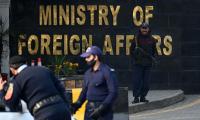PESHAWAR: The Auditor General of Pakistan has found serious irregularities and anomalies amounting to Rs1,388 million during the special audit of COVID-19 funds of Khyber Pakhtunkhwa Health Department for the financial year 2020-21.
This also includes fraudulent payments of Rs296 million. The report also exposed negligence, weaknesses, lack of financial control of the health department, highlighting losses to the national exchequer, overpayments, fraudulent payments, misuse of funds, irregularities, and doubtful payments, showing mismanagement, as the officials made illegal purchases, exceeding their authority. The report also exposed the purchase of different items at higher prices while ignoring the lowest rates.
A senior official told this correspondent that the audit report has pointed out several irregularities, saying the department has given detailed replies to every observation and has contested all those observations. “As per laid down procedure any observation raised or any irregularity pointed out by audit team, then the department gives its reply accordingly. If any issue is left unresolved then it is discussed in the departmental accounts committee (DAC) meeting and if not resolved there then it’s taken to the public accounts committee (PAC). If any para is not settled in PAC then it can be called irregularity and as per directions of the PAC, action is taken”, he said.
During the special audit of COVID-19 emergency funds, it was observed that an amount of Rs78,000,000 was paid to a Karachi-based company for the supply of 400,000 Automated RNA extraction kits at the rate of Rs195 per piece. However, the scrutiny of the bidding documents revealed that the best-evaluated bid and lower rate of Rs179 were not accepted, which resulted in a loss of Rs6.400 million to the government kitty. Furthermore, the two rejected firms have also submitted their grievances against the technical specification, which was not responded, making the bidding questionable.
Similarly, the contrary to the set criteria, the management selected and awarded the contract to the second. Best evaluated bid testing laboratory by ignoring the highest marks and best-evaluated bid. Hence, the payment made amounting to Rs449.088 million was irregular and unauthorized. Furthermore, Islamabad-based lab was sent COVID tests beyond its capacity. A payment of Rs449,088,550/- was made to the lab. However, contrary to the set capacity of the private lab, the management of the DGHS office on daily basis forwarded the COVID-19 patient tests in excess to the private lab without considering their daily test capacity, which resulted in the fraudulent drawl of funds by engaging the private lab.
The audit held that how the management of the DGHS office ignored the test capacity and forwarded tests in excess of their capacity just to withdraw the amount. Hence, a loss of Rs296.100 million was incurred to the national exchequer. It was noted that an expenditure of Rs1,324.218 million was incurred by the DG Health on the purchases of machineries, equipments, medicines, diagnostic kits, and hiring of different services. However, the sub-committee constituted for the purpose has not carried out the necessary review of the procurements. In a sub-committee meeting, held on May 5, 2020, and chaired by Health Minister, Advisor to Chief Minister on Energy & Power had raised an observation asking the Health Department to explain the reasons behind the non-responsiveness of six out of 10 submitted bids of the private labs. He especially asked for the reasons for the disqualification of bids by well-known institutions. Minister for Law, Parliamentary Affairs also endorsed the observations of the Advisor. The Chairman explained the position, but could not satisfy the members, who did not sign the minutes of the meeting. The entire procurement process becomes doubtful.
Another enterprise was selected as the best evaluated bidder for Rapid Antigen Test kits, having ABBOTT / SD brand and rapid antigen test (WHO) JOYSBIO brand at Rs835/- per unit. A supply order was issued to the firm for 20,000 units of rapid antigen test (ABBOTT brand) at Rs835/- per unit and 80,000 units of Rapid Antigen Test JOYSBIO brand. The rejected firm submitted that the purchase order was issued to the selected firm is against the required specification and a violation of the procurement. It may be due to the submission of forged/fake WHO documents by the company against which action for blacklisting needs to be taken.
The record revealed that the company supplied antigen test (SARS-CoV-2) of Korean origin instead of USA. However, the management rather than taking any action against the firm for misleading the purchase committee by submitting fake documents conducted another purchase process of the same items, in which again the same company was selected at the high rate of Rs948/ per unit. The audit held that the procurement committee granted undue favor by selecting the same firm for the same item instead of taking action against the firm for fake documents, which shows sheer mismanagement and faulty procurement system. Furthermore, the illegal purchase of rapid antigen caused the national exchequer an amount of Rs373.512 million losses.
During the special audit of the account records, it was noticed that an amount of Rs12,000,000/- was paid to a company on account of supply of 200,000 pieces of VTM 10ml tubes with Nasal swab (CE Marked) HCBIO Life Sciences USA, at the rate of Rs60/- per unit. The management issued two separate supply orders each of 100,000 units, just on the last dates of the proper bidding process in which another company was selected at the price of Rs48/- per unit, resulting in a loss of Rs2.400 million to the government. The audit record revealed that the selection of contractors at higher rates for cardiac monitors resulted in a loss of Rs2.444 million. An amount of Rs5,399,775 was paid to a private company on account of the supply of 45 cardiac monitors at the rate of Rs119,995 per unit.
However, scrutiny of the bidding documents revealed that the best evaluated bid and lower rate of Rs75,000 for the cardiac monitors Model SPR9000A were considered non-responsive with the reason that the certificate attached is not readable, which resulted in a loss of Rs2.444 million to the government kitty. Similarly, an amount of Rs3, 000,000 was also paid for the supply of 30 cardiac monitors at the rate of Rs100,000 per unit by ignoring the lower rate of Rs79,000, which resulted in a loss of Rs420,000. Audit held that the management ignored the lower rates on the very insignificant matter by giving undue favor to the selected contractor, which resulted in a loss of Rs2,444,775 to the government. It was observed that an amount of Rs45.3 million doubtful amounts were paid to the contractors for the supply of 300 cardiac monitors at different rates.
The DG Health paid an amount of Rs8,400,000 for the supply of 60 cardiac monitors at the rate of Rs140,000/- per unit. However, scrutiny of the goods declaration documents revealed that the contractor has purchased the 100 units of cardiac monitors at the cost of USD35,840 at the exchange rate of Rs167.250, which comes to Rs59,876 per unit. However, the contractor offered the rate of Rs140,000/- per unit accepted by the procurement committee, which was in excess of Rs80,124/- per unit than the purchase price. Audit held that the government was put a loss of Rs3,000,000/- which could have been avoided. An amount of Rs49,700,000/- was paid on account of the supply of 1,000 oxygen cylinders at the rate of Rs49,700/- per unit. However, the management did not consider the lower rate of Rs38,000 per unit, due to which the government kitty sustained the loss of Rs0.549 million.
KP Health Department purchased oxygen cylinders ranging from Rs28,000 to Rs119,000. However, the data submitted by the Health Department to NCOC showed that the market value of one small cylinder was Rs18,000 to Rs20,000/- and that of a large cylinder was from Rs23,000/- to Rs25,000/-. The purchase of cylinders at the rates aforementioned resulted in a loss of Rs44,064,775 to the government. Similarly, an amount of Rs368.705 was shown and paid to the members of two teams for the collection of COVID samples at their doorsteps. The payment was made to the team members as an incentive at a fixed daily rate of Rs4,500 and Rs3,500 per day, in addition to their monthly salary. The incentive was paid to the government employees, who were already drawing salaries from the provincial exchequer.
In almost all of the cases, the amount of incentive per month was more than the monthly salaries of the employees. The sanction of the expenditure was not granted by any competent official/ authority. The payment was made on the simple list, which make the payment doubtful and could not be authenticated. Another amount of Rs368.705 million was shown and paid to the officials as incentives. However, the office did not produce the detailed record for necessary audit scrutiny, despite repeated requests for the record but was not provided, thus the audit could not verify the expenditure.
It was noticed that Naeem Khan appointed as a Drug Inspector (BPS-17) was notified, being an expert in procurement and technical assistant of KPPRA. However, the said officer participated in the purchase committee meetings and at the same time, the officer was found to be working and attending the meetings of the inspection committee as a Director M&E DGHS Peshawar. Similarly, 1,400 rapid antigen kits costing Rs1.137 million were found missing in the District Head Quarter Hospital Mohmand. During the physical inspection of the hospital a quantity of only 200 (RAT’s) was shown and taken on stock, and the remaining quantity of 1,200 (RAT’s) was neither taken on stock nor its utilization recorded in black & white. Furthermore, a mobile digital x-ray system costing Rs10.599 million was provided during the COVID-19 to the DHQ hospital KDA Kohat.
However, the DGHS office failed to provide the necessary computer system and batteries of cassettes, which were mandatory to functionalize the said X-Ray machine despite repeated requests and elapse of one and a half year.
Khawar Manika's counsel continued his arguments on Wednesday in a petition filed by Imran Khan and Bushra Bibi
IHC reserved judgment on the petition against registration of cases against former interior minister Sheikh Rashid on...
Saudi woman who was reportedly kidnapped from Islamabad’s residential Sector F-8 in mysterious circumstances, has...
Pakistan Navy warship rescued 8 Iranian fishermen after their boat caught fire in the open sea
SC dismissed appeal against SHC order that turned down application of partner seeking extension of time to furnish...
Executive board of International Monetary Fund will meet on April 29 to discuss the approval of $1.1 billion funding...







